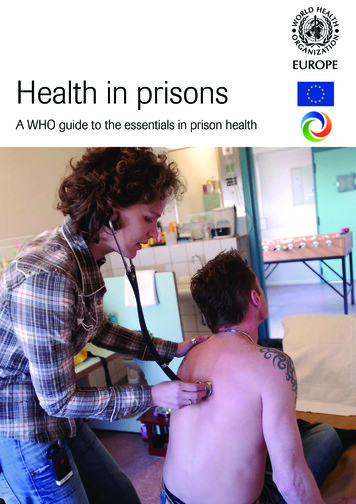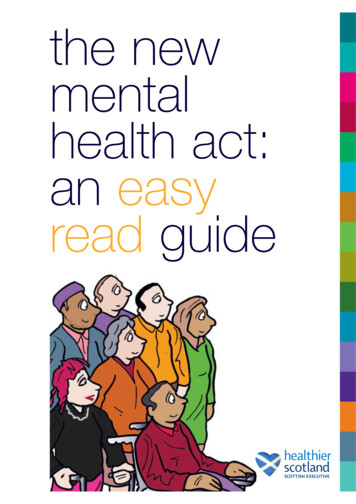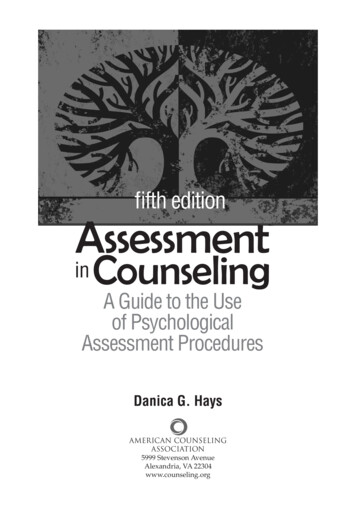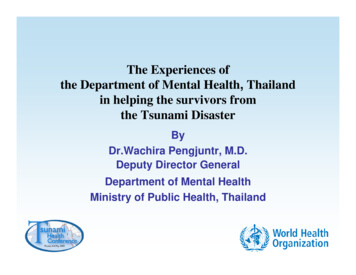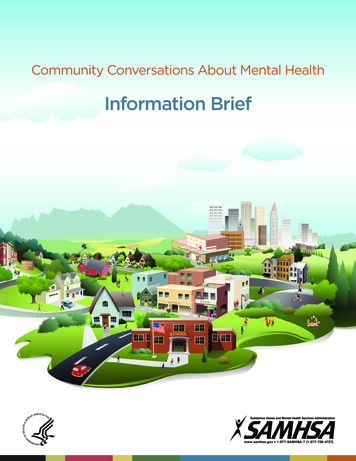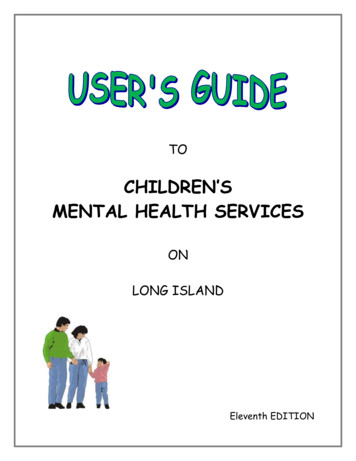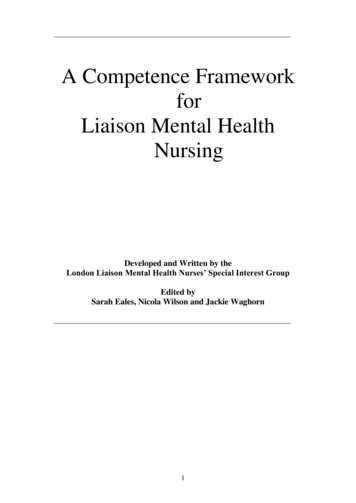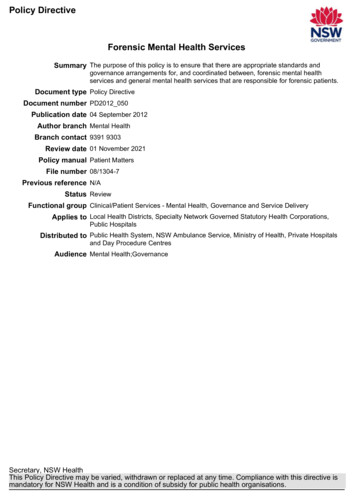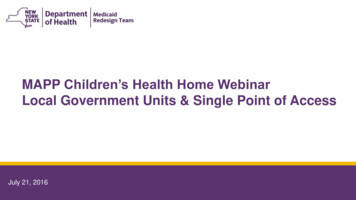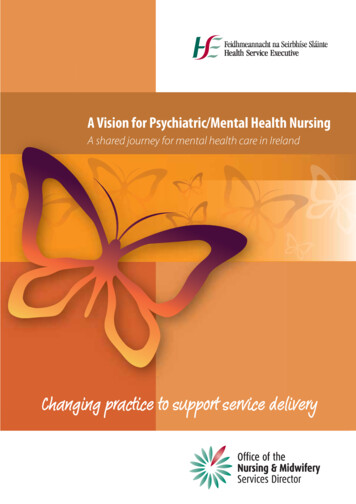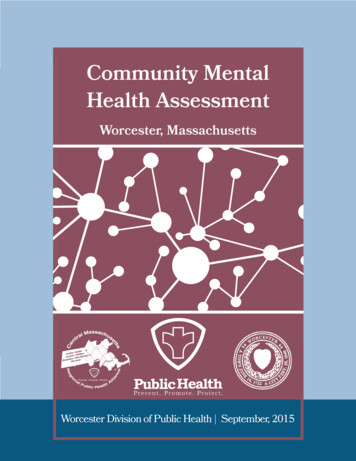
Transcription
Community MentalHealth AssessmentWorcester, MassachusettsWorcester Division of Public Health September, 2015
Worcester Community Assessmentof Mental Health NeedsPURPOSE:As part of the 2012 Greater WorcesterCommunity Health Improvement Plan, thecompletion of a “Mental Health Assessment”was identified as a priority for gaining a betterunderstanding of the challenges faced bythe large proportion of the population whoencounter the mental health care system inWorcester, MA.
Primary AuthorsEsteban Cardemil, Ph.D., Clark UniversityRosalie Torres Stone, Ph.D., Clark University, UMass Medical SchoolKristen Keefe, M.A., Clark UniversityProject ManagersPaige Bik, MSW, Worcester Division of Public HealthZach Dyer, MPH, Worcester Division of Public HealthThis Community Assessment of Mental Health Needs was conducted November 2014 through May 2015.It serves as a basis for future health improvement efforts by the Worcester Division of Public Health andits partners as they relate to mental health. It is also intended that this document serve as a resourcefor community organizations and individuals working to improve mental health in Worcester. The datapresented are as up-to-date as available at the time of publication. Future assessments including updates tothis data will be included as part of the comprehensive regional Community Health Assessment publishedevery three years and updated annually.For more information eholder Advisory CommitteeAscentria Care AllianceClark UniversityCenter for Health ImpactCommon PathwaysCommunity Legal AidFallon Community Health PlanFamily Health Center of Worcester, Inc.Pernet Family Health Service, Inc.Latin American Health AllianceThe Hector Reyes HouseSoutheast Asian CoalitionSpectrum Health Systems, Inc.The Bridge of Central Massachusetts, Inc.Worcester Division of Public HealthUMass Memorial Medical CenterWorcester Police DepartmentWorcester Youth CenterQualitative InterviewsAscentria Care AllianceCentro las AmericasCommunity HealthlinkCommunity Legal AidEdward M. Kennedy Community Health CenterFaith Tabernacle ChurchFallon Community Health PlanFamily Health Center of Worcester, Inc.Genesis Club, Inc.Hahnemann Family Health CenterLatin American Health AllianceThe Hector Reyes HouseMulticultural Wellness CenterPernet Family Health Service, Inc.Pathways for Change, Inc.Southeast Asian CoalitionThe Bridge of Central Massachusetts, Inc.Worcester Police DepartmentWorcester Refugee Assistance ProjectVA Central Western Massachusetts HCSUMass Memorial Medical CenterFunding for this assessment was generously awarded to the Worcester Division of Public Healthby the Fairlawn Foundation of the Greater Worcester Community Foundation.
Worcester CommunityMental Health AssessmentExecutive SummaryThe 2015 Worcester Community Mental Health Assessment is a community-based overview of thechallenges Worcester residents, providers, and Executive Directors report seeing on a daily basis, thedifferent perspectives residents hold about mental health and treatment, the various approaches tocoping with stress that residents demonstrate, and the barriers and facilitators relevant to accessingmental health services.The current study was conducted by Drs. Esteban Cardemil and Rosalie Torres Stone, as well as KristenKeefe, M.A., as a collaborative effort among the Worcester Division of Public Health (WDPH), ClarkUniversity, and the Systems and Psychosocial Advances Research Center (SPARC) of the Universityof Massachusetts Medical School. The project was part of the WDPH’s larger, ongoing CommunityHealth Improvement Plan (CHIP); the final report will be released to the public in Fall 2015.This Executive Summary briefly summarizes the among Worcester residents. Groups thatmain findings obtained from this work:demonstrated elevated hospitalization rates Key challenges facing Worcester residents on were men, as well as individuals from White, nonHispanic and Black, non-Hispanic backgrounds.a daily basisMen also documented elevated suicide rates, as Numerous barriers in the provision of mental compared with women. Significant numbers ofhealth services, andWorcester residents also reported being unable Recommendations that can inform policyto access health services due to cost concerns.regarding the delivery of mental healthThe Qualitative data focused on four differentservicesareas:The results of the Worcester Mental Needs1. Identifying the most common dailyAssessment demonstrate that addressingchallenges facing Worcester residents,the mental health needs of the Worcesterwhich included:community can be successfully addressed by: Economic stress Developing mechanisms for enhancing Exposure to violence and traumacollaboration among mental health careprovider and other related service providers Substance use disordersregarding mental health Medical comorbidity Expanding access and tailored services tomeet the specific needs of the community inorder to improve mental health outcomesQuantitative data highlighted the elevated ratesof poor mental health days and hospitalizations Non-Western conceptions of mentalhealth and treatment Stigma, especially for immigrant andrefugee groups, as well as militaryveteransWorcester Community Mental Health Assessment Page ii
2. Understanding how Worcesterresidents understand mental healthissues, which highlighted that: Some community residents,especially immigrant andrefugee residents, do not alwaysrecognize symptoms of stressas psychological in nature andpossibly treatable.Stigma is a common concern, andmay be particularly pronounced inimmigrant and refugee populations,as well as military veterans.3. Learning about the common copingstrategies used by Worcester residents.Results indicated: Numerous adaptive copingstrategies including bothindividually-oriented strategies (e.g.,exercise, meditation, relaxation)as well as more socially-orientedapproaches (e.g., support fromfriends and family, structured socialactivities).Religious and spiritual copingemerged as particularly salientfor racial and ethnic minoritypopulations.Primary authorsEsteban Cardemil, Ph.D., Clark UniversityRosalie Torres Stone, Ph.D., Clark University, UMass SPARCKristen Keefe, M.A., Clark UniversityProject ManagersPaige Bik, MSW, Worcester Division of Public HealthZach Dyer, MPH, Worcester Division of Public HealthStakeholder Advisory CommitteeAscentria Care AllianceClark UniversityCenter for Health ImpactCommon PathwaysCommunity Legal AidFallon Community Health PlanFamily Health Center of Worcester, Inc.Pernet Family Health Service, Inc.Latin American Health Alliance / The Hector Reyes HouseSoutheast Asian CoalitionSpectrum Health Systems, Inc.The Bridge of Central Massachusetts, Inc.Worcester Division of Public HealthUniversity of Massachusetts Memorial Medical CenterWorcester Police DepartmentWorcester Youth Center4. Identifying the barriers to utilizationof mental health services. Findingsdemonstrated that commonly experiencedbarriers included: Long waiting lists Navigating the mental health system Language barriers Logistical barriers (i.e., hours ofoperation, transportation, andinsurance copays).Taken together, these results from theWorcester Community Assessment ofMental Health Needs led to the followingrecommendations to improve the mentalhealth needs of the Worcester community:1.Greater and broader coordinated care2.Increased use of case managers,patient navigators/advocates,community health workers3.Greater network/community amongproviders4.More mental health education5.Culturally competent care6.Extended hours of operation andbetter transportation support7.More opportunities for social interactionQualitative InterviewsAscentria Care AllianceCentro las AmericasCommunity HealthlinkCommunity Legal AidEdward M. Kennedy Community Health CenterFaith Tabernacle ChurchFallon Community Health PlanFamily Health Center of Worcester, Inc.Genesis Club, Inc.Hahnemann Family Health CenterLatin American Health Alliance / The Hector Reyes HouseMulticultural Wellness CenterPernet Family Health Service, Inc.Pathways for Change, Inc.Southeast Asian CoalitionThe Bridge of Central Massachusetts, Inc.Worcester Police DepartmentWorcester Refugee Assistance ProjectVA Central Western Massachusetts HCSUniversity of Massachusetts Memorial Medical CenterFunding for this assessment was awarded to the Worcester Division of Public Healthby the Fairlawn Foundation of the Greater Worcester Community Foundation.Worcester Community Mental Health Assessment Page iii
ContentsProject Overview. 1Quantitative Methodology.2Qualitative Methodology.3Limitations. 6Quantitative Findings. 6Qualitative Findings. 9Common Challenges in Worcester Community. 9Making sense of mental health issues. 13Coping with stressors: Prominent role of religion and spirituality and community. 15Barriers and Facilitators to Mental Health Services. 17Summary of Findings. 21Recommendations. 22References. 30Primary Authors. 32Worcester Community Mental Health Assessment Page iv
Project Overview“Mental health is a state of successful performance of mental function,resulting in productive activities, fulfilling relationships with otherpeople, and the ability to adapt to change and to cope with challenges.Mental health is essential to personal well-being, family andinterpersonal relationships, and the ability to contribute to communityor society.” (Healthy People 2020)One of the goals of Healthy People 2020 is to improve the mental health of the U.S. populationthrough prevention and access to appropriate, quality mental health services. However, as 2020approaches, the burden of mental disorders remains high, with estimates of lifetime prevalencerates of any mental disorder ranging as high as 46.4% (Kessler, Merikangas, & Wang, 2008). In 2012,there were an estimated 43.7 million adults aged 18 or older in the U.S. with any mental disorderin the past year, representing approximately 18.6 percent of all U.S. adults (SAMHSA, 2012). Themost prevalent disorders include anxiety disorders, externalizing disorders, mood disorders, andsubstance use disorders (Kessler et al., 2008). Importantly, large numbers of individuals experiencesubthreshold symptoms of disorders that are significant enough to warrant clinical attention. Forexample, approximately 40% of people in 35 states reported experiencing serious psychologicaldistress (SPD) over the past 30 days (Center for Disease Control and Prevention [CDC], 2007).Despite the existence of numerous efficacious psychosocial and pharmacological treatments formental disorders, many individuals in need do not receive adequate treatment (Wang, Demler andKessler 2002). For example, in the National Comorbidity Survey – Replication (NCS-R) study, only30.5% of individuals who met criteria for a DSM-IV disorder in the past year received treatmentfor it and those in treatment often received suboptimal treatment (Kessler et al., 2008). Althoughtreatment rates were higher for individuals with severe symptom levels, the majority of theseindividuals did not receive any treatment (59.5% received no treatment). Among respondentsin the Behavioral Risk Factor Surveillance survey who indicated they had serious psychologicaldistress, only 37.7% received mental health services in the preceding year and 53.4% were currentlyreceiving no treatment (CDC, 2007). Importantly, research has consistently documented disparitiesin access, utilization, and engagement of mental health services. In particular, racial and ethnicminorities (including immigrant and refugees), individuals from lower socioeconomic backgrounds,and men are less likely to receive adequate mental health care (Gonzales & Papadpoulos, 2008;Kessler et al., 2008; Snowden, 2012, Berdahl & Torres Stone, 2009).Research on barriers to mental health care has advanced our understanding of the barriers thatexist for many individuals who wish to access services. And yet, despite this increased information,there remain significant numbers of individuals who are not receiving the mental health care theyneed. While there likely exist many potential solutions to this public health problem, one avenuethat has received relatively little attention is the role that community-based participatory research(CBPR) can play in addressing gaps and barriers in the health care system (Wallerstein & Duran,2006). CBPR has been defined as “a systematic effort to incorporate community participation anddecision making, local theories of etiology and change, and community practices into the researcheffort” (Wallerstein & Duran, 2006, p.313). With regards to improving the health care system, CBPRcan play an important role in the development of locally conducted needs assessments (Cardemilet al., 2007). These locally conducted needs assessments can provide communities with a moreWorcester Community Mental Health Assessment Page 1
nuanced understanding of the needs that are relevant to their particular populations, can lead tocollaborative efforts to address mental health needs, and they can empower communities to makethe changes needed (Cardemil et al., 2007; Doombos, Zandee, DeGroot, & Maagd-Rodriguez, 2013).In recognition of the benefits of a community-based needs assessment, we conducted theWorcester Mental Health Needs Assessment (WMHNA). The WMHNA was a study funded by theFairlawn Foundation as part of the Worcester Department of Public Health’s Community HealthImprovement Plan (CHIP), whose aim is to advance Worcester to the healthiest city in NewEngland by the year 2020.The purpose of this study is to increase our community’s understanding of the perceived mentalhealth experiences and issues faced by Worcester residents. Because of the relative lack ofinformation on this topic, we used quantitative and qualitative methods to engage membersof several community based organizations (e.g., medical clinics, churches, and mental healthand social service agencies) in a CBPR approach. Therefore, the WMHNA attempts to identifystrategies for informing the Worcester community about the study and to ensure that theinterests of community members and potential study participants are considered.To develop and complete the project, a community stakeholder advisory board was developedrepresenting a cross section of the target community. The community stakeholder advisoryboard was actively involved in all phases of the research process particularly in identifying studyquestions, participants, interpretation, and dissemination of findings.Quantitative MethodologyThe quantitative data for this mental health needs assessment were obtained from two primarysources: the Behavioral Risk Factor Surveillance System (BRFSS) from the Center for DiseaseControl (CDC) and the MassCHIP from the MA Department of Public Health.BRFSS is a CDC-run health-related telephone survey system that collects data at the state andlocal levels from U.S. residents. The survey focused on a variety of health-related risk behaviors,chronic health conditions, and use of preventive health services (www.cdc.gov). For the 2015Worcester Mental Health Needs Assessment, data were gathered that focused primarily onmental health topics.The Mass CHIP gathers yearly health data from a variety of sources at the state and local levels.The data are provided in variety of formats, including raw counts, age-adjusted estimates offrequencies per 100,000 individuals, and standardized ratios. While useful, raw counts do not takeinto consideration the relative size of the population being studied and so do not allow for relativecomparisons. Age-adjusted estimates of frequencies per 100,000 allow for relative comparisonsacross groups, while standardized ratios allow for relative comparisons of rates between Worcesterand the overall Commonwealth of Massachusetts. Because Commonwealth of Massachusettsfrequencies are set as the comparison point (standardized ratio 100), standardized ratios forWorcester populations above 100 indicate higher rates than in Massachusetts as a whole, whilestandardized ratios below 100 indicate lower rates. Standardized ratios are presented for bothhospitalization (i.e., standardized hospitalization ratios or SHR) and suicide rates (i.e., standardizedmortality ratios or SMR).Worcester Community Mental Health Assessment Page 2
Qualitative MethodologyThe qualitative data for this mental health needs assessment come from 61individuals whorepresented Worcester residents and/or consumers of mental health services, as well as providersof mental health and community-based services in Worcester. Individuals participated in eithera focus group or an individual interview with research staff. The interviews were based on priorwork conducted by Cardemil and colleagues (2015) that explored the relationship among howindividuals conceptualize and experience their mental health challenges, their attitudes and beliefsabout coping with these challenges, and their experiences with the mental health care system.Interviews were semi-structured in format and delivered in an open and informal nature thatallowed for a dynamic exchange of ideas (Miles, 1994; Mishler, 1986). Study participants wereencouraged to respond in the form of narratives (Mishler, 1986) about their personal experienceswith life stressors, mental health challenges, and the mental health care system. Probes wereused to elicit additional details and explanations. Interviews were recorded and transcribed, andmajor themes that emerged across the interviews were identified (Miles, 1994). In this report,we summarize findings from our analyses of the qualitative data collected via focus groups andindividual interviews.ProcedureRecruitment of service providers in Worcester was conducted with the help of our communitystakeholder advisory board, comprised of a number of Executive/Program Directors ofWorcester-based services. In order to ensure that multiple perspectives were considered, weprioritized recruitment of providers across a broad range of service-providing organizations.These organizations included health and mental health centers, social services agencies,immigrant and refugee assistance programs, legal consultation services, faith-basedorganizations, and law enforcement. Inclusion criteria included experience as a service providerin Worcester; there were no exclusion criteria.Worcester residents and/or consumers of mental health services were recruited with the helpof providers and Executive/Program Directors on our community stakeholder advisory board.In addition to recruiting individuals via clinician referral, research staff posted flyers advertisingthe project at local community organizations and via online “listservs.” Inclusion criteria includedbeing 18 years or older; no exclusion criteria applied. However, the research staff was only able toaccommodate data collection in English, Spanish, and Vietnamese. Research staff utilized clinicaljudgment to determine individuals’ current mental health status and capacity to give consent.All individuals provided informed consent prior to participating. In the focus group setting,research staff reviewed the consent form with the group as a whole, and each participant signedan individual copy of the materials. Participants who expressed discomfort with the groupsetting were given the option of an individual interview instead. Informed consent proceduresfor participants completing an individual interview took place at Clark University or in anotherprivate space to ensure confidentiality. All demographic information was obtained throughparticipant self-report. Participants also agreed to be audio recorded during the interviewprocess. In isolated instances, participants refused to be audio recorded; research staff tookdetailed notes throughout these interviews instead. Finally, individuals were paid 25 percompleted interview or focus group.All procedures and materials were reviewed and approved by the Institutional Review Boards atWorcester Community Mental Health Assessment Page 3
Clark University, University of Massachusetts Medical School, and the MA Department of MentalHealth. Additionally, when participating organizations necessitated independent review of theproject, research staff ensured that all necessary organizational requirements were met.MaterialsFollowing the provision of informed consent, participants completed a demographicquestionnaire prior to starting the interview. Focus groups lasted approximately 1.5 hoursand covered a range of topics. Interviews lasted about 30 minutes and explored the sametopics as those discussed in the focus groups. Among resident/consumer focus groups andinterviews, participants were asked to discuss common challenges experienced in the Worcestercommunity, their ideas about mental health, coping strategies for dealing with stress, theirexperiences with mental health services in Worcester, and recommendations for improvedservice-delivery. See Table 1.1.2.3.4.5.Table 1. Focus Group / Interview questions for Worcester residentsLet’s talk about the common challenges people experience on a day to day basis – thatyou have experienced, your family and/or friends have experienced, or that you’veheard other individuals in the community have experienced, and so on.You’ve talked about your life stressors and challenges. As you can imagine, we thinkthat these things are deeply connected to mental health. What do you think aboutmental health more generally?What are the different ways in which you or other individuals in your communitymanage these stressors?What have your experiences or others’ experiences that you know been with trying toaccess mental health services in Worcester?Do you have any recommendations about the provision of services in Worcester, orservices that don’t exist that you’d like to see exist, or additional social assistanceprograms?Provider and Executive Director focus groups and interviews explored similar topics though, inaddition to exploring their perception of consumers’ attitudes and experiences, providers wereasked to discuss barriers and facilitative factors in delivering care. See Table 2.1.2.3.4.5.Table 2: Focus Group / Interview questions for Providers and Executive DirectorsWhat are the most common challenges you see people experiencing in the Worcestercommunity?How do you understand consumers’ and residents’ ideas and attitudes towards mentalhealth? How do you see stigma interfering with help-seeking?What are the most common ways you see people coping with their life stressors andmental health challenges?What are your perceptions of individuals’ experiences in trying to access mental healthservices in Worcester?What gaps do you see in the system or in your particular organization? How could serviceprovision in the Worcester community be improved?Worcester Community Mental Health Assessment Page 4
ParticipantsA total of 61 individuals participated in the project, including both Worcester residents and/orconsumers of mental health services, as well as a broad range of service providers in the Worcestercommunity. In total, 26 Worcester residents and consumers participated in the study. Theseparticipants ranged in age from 24 to 74, with a mean age of 56.6 years (SD 13.4). The sample wasracially and ethnically diverse, with 88% of the participants self-identifying as racial/ethnic minoritiesand just over two-thirds of the sample indicating they were U.S. immigrants. Slightly more than halfthe sample were men (58%), just under half were single (42%), and more than half of participants(77%) had less than a college degree. Participants were also predominantly from low-incomebackgrounds, with half of the sample reporting that they earned less than 10,000 per year.When asked to describe their mental health challenges, including particular diagnoses they felt fittheir experiences, approximately half of the sample (n 15) endorsed having struggled with mentalhealth issues. Among these fifteen participants, individuals described their psychological difficultiesin a variety of ways: some with diagnoses (i.e., depression, anxiety, bipolar disorder, and post-traumaticstress disorder); others according to symptoms (i.e., trouble concentrating or forgetfulness). Relatedly,seventeen participants acknowledged having accessed mental health services, which included bothspecialty services as well as receiving medication from their primary care providers (PCP). It wastypical for individuals having accessed mental health treatment to report engagement with multipleservice modalities (i.e., psychiatry, individual therapy, and group therapy). Specifically, 16 participantshad seen a psychiatrist or their PCP for medication, 11 had engaged with psychotherapy, and 6 hadsought substance abuse treatment.With regards to service providers, 8 participants were mental health providers, 15 were non-mentalhealth providers, and 12 were Executive/Program Directors from participating organizations.All of the mental health providers had received an advanced degree past college (i.e., Masters orDoctoral degree), and the majority practiced both individual- and group-based therapy. Collectively,they provided services to a broad range of adult consumers, who were predominantly from lowincome backgrounds and diverse with regard to race/ethnicity. The non-mental health providersencompassed a wide range of community-based services including case management, social services,legal consultation, law enforcement, and faith-based support. Just over half of the non-mentalhealth providers (n 8) supported the immigrant and refugee populations in Worcester. Similarly,participating Executive/Program Directors represented a breadth of service agencies in Worcester,including health centers, community mental health centers, a health insurance provider, and socialservices agencies. The consumers served by their organizations included the following: patients ofhealth/mental health centers (both youth and adult), individuals with serious mental illness requiringemployment assistance, immigrant and refugee populations, and victims of violence.Data Analysis ProcessFollowing data collection, research staff transcribed the interview and focus group audio recordings.To ensure that multiple perspectives were considered throughout the analysis process, the principalinvestigators and project manager each independently transcribed several audio recordings tobecome familiar with the data. The research team was engaged in active discussion about emergentpatterns in the data prior to formally identifying the most commonly endorsed themes (Braun &Clarke, 2006; Patton, 2002). The research aims and focus group/interview questions organized ourcoding of the data and facilitated identification of the final thematic scheme presented in this report.Worcester Community Mental Health Assessment Page 5
LimitationsOur study contained several methodological limitations. First, this study was conducted with apurposive adult sample of 61 Worcester community residents/and or consumers, a broad range ofservices providers, and Executive Directors who reported on different experiences with the mentalhealth care system; and thus findings from this study cannot be generalized to all Worcester adults.This is important because variation in individual experience with mental health systems influencewhat participants perceive as important mental health needs. Second, given time and budgetconstraints, our sample was limited to Worcester residents who were able to speak one of threelanguages (English, Spanish, or Vietnamese). We were able to recruit and interview Burundi- andArabic-speaking providers in an effort to overcome this limitation. However, there are particularimmigrant communities whose perspectives we were unable to acquire. Finally, it is likely that most ofthe individuals who participated in the WMHNA had strong opinions about mental health and mentalhealth care that they wished to share with the researchers. This unavoidable characteristic raises therisk of bias in our findings, especially since it is more likely that individuals will hold strong, negativeopinions.However, we mitigated these concerns by recruiting a wide range of participants through wordof mouth, clinician referrals, and flyers. We also focused our analyses on those themes that wereidentified across the three groups i.e., Worcester community re
Nov 12, 2015 · Worcester Community Assessment of Mental Health Needs led to the following recommendations to improve the mental health needs of the Worcester community: 1. Greater and broader coordinated care 2. Increased use of case managers, patient navigators/advocates, community health workers 3. Grea

